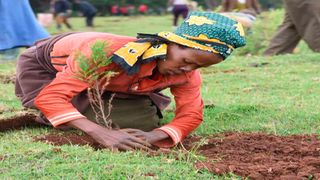
Margaret Chepkoech plants a tree at Kaptagat Forest in Elgeyo Marakwet County on July 23, 2021 as part of reforestation efforts.
| Jared Nyataya | Nation Media GroupSeeds of Gold
Premium
What we must all do to ease the effects of climate change
What you need to know:
- Deforestation in most countries was cited as one of the things that have accelerated climate change.
- Thus, farmers were advised to plant trees on the edges of their farms to boost forest cover.
Erratic rains, increased pests and diseases and frequent dry spells are some of the effects of climate change farmers in East Africa are grappling with.
So severe are the changes that they have disrupted farming seasons and become a threat to food security in the region and across the globe.
And as they continue to unfold, experts at the recently held Alliance for a Green Revolution in Africa (Agra) Nation Leadership Forum called for intensification of mitigation measures across east Africa to boost food production.
Dr Agnes Kalibata, the Agra President, noted that agricultural activities account for 30 per cent of factors that speed up climate change.
“We should make sure the work we undertake as farmers does not contribute to climate change,” said Dr Kalibata at the forum whose theme was ‘Building Africa's resilient food system’.
Dr Kalibata, who is also the UN Secretary-General Special Envoy for the Food System Summit, noted that development of the continent is anchored around farmers thus they are best placed to lead climate mitigation measures.
“The continent cannot advance unless we make progress on climate change, which defines our world,” she said.
Boost forest cover
Deforestation in most countries was cited as one of the things that have accelerated climate change.
Thus, farmers were advised to plant trees on the edges of their farms to boost forest cover.
“If one has 10 acres, they can grow up to 10,000 trees which will help address deforestation challenges,” said Ruth Maraba, the treasurer of Kenya National Farmers Federation (KNFF).
Maraba observed that farmers have no choice but to plant trees as she suggested an easy formula one can use.
“We can go with ages. People to plant trees equivalent to their ages. If you are 20, plant that number of trees. This will help us stem droughts as forests attract rain,” she said at the forum that brought together farmers, agriculture experts and leaders and policymakers from across East Africa.
President Uhuru Kenyatta in March 2019 affirmed Kenya’s commitment to achieve a minimum of 10 per cent forest cover by 2022 as part of the country’s efforts to address climate change challenges.
The Head of State said the government has identified forestry as key in the realisation of the nation’s development agenda, and is implementing the national green growth strategy.
Major challenge
Mr Arthur Nsubuga, a Ugandan farmer, noted that measures to boost food production amid climate change are expensive.
“I have embraced irrigation that helps me grow crops and trees but this does not cheap,” he said as he called on governments to subsidise the technology.
Dr Geoffrey Kirenga, the chief executive of Southern Agricultural Growth Corridor of Tanzania (SAGCOT), said predicting the weather has become a major challenge due to climate change.
“At times the rains end before maturity of crops. The situation here in Tanzania cuts across almost all African countries,” he said.
Adding, “Private and government stakeholders should work together to help embrace technology to correct and conserve soils.”
In Ethiopia, Prof Nega Wubeneh, the Agra country manager, said the country has a robust, government-funded extension system through which information on climate mitigation is disseminated.
Mr John Bosco, the CEO of East Africa Business Council, said countries should focus on resilience and sustainability of the sector.
Small-scale farmers
“What we lack is information, in both government and private sectors. We need a platform that brings youths and women together, they share opportunities. They create about percent in the agricultural sector,” he explained.
Prof Ruth Oniango, the founder of Rural Outreach Africa (ROA), called for empowerment of small-scale farmers.
“We should be concerned about small-scale farmers who feed the world. We are not food secure. Covid-19 has taught us that food is more than just cereals such as maize,” she explained.
Prof Joshua Ogendo, an associate professor in the Faculty of Agriculture, Egerton University, asked the government to put more emphasis on water harvesting.
“I know the country has made a lot of investment in other sectors such as oil. Money should also be channelled to water harvesting to empower small-scale farmers and transform all productive areas,” Prof Ogendo stated.
Prof Hamadi Boga, the Agriculture principal secretary, said the major challenge facing local farmers is failure to do soil tests to enable them to embrace good agronomic practices.
“We are working closely with county governments, encouraging farmers to do soil tests and improve storage infrastructure to curb post-harvest losses,” said the PS.





